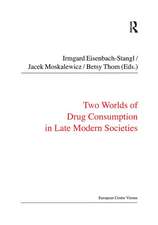Institutional Responses to Drug Demand in Central Europe: Routledge Revivals
Autor Flip Maas Editat de Patrick Kenisen Limba Engleză Hardback – 15 apr 2019
| Toate formatele și edițiile | Preț | Express |
|---|---|---|
| Paperback (1) | 160.55 lei 6-8 săpt. | |
| Taylor & Francis – 29 ian 2019 | 160.55 lei 6-8 săpt. | |
| Hardback (1) | 496.94 lei 6-8 săpt. | |
| Taylor & Francis – 15 apr 2019 | 496.94 lei 6-8 săpt. |
Din seria Routledge Revivals
-
 Preț: 258.66 lei
Preț: 258.66 lei - 9%
 Preț: 1038.45 lei
Preț: 1038.45 lei - 9%
 Preț: 934.94 lei
Preț: 934.94 lei -
 Preț: 238.40 lei
Preț: 238.40 lei -
 Preț: 294.72 lei
Preț: 294.72 lei -
 Preț: 258.52 lei
Preț: 258.52 lei - 9%
 Preț: 903.41 lei
Preț: 903.41 lei - 18%
 Preț: 695.85 lei
Preț: 695.85 lei -
 Preț: 296.10 lei
Preț: 296.10 lei -
 Preț: 342.36 lei
Preț: 342.36 lei - 9%
 Preț: 764.28 lei
Preț: 764.28 lei -
 Preț: 317.54 lei
Preț: 317.54 lei - 9%
 Preț: 619.48 lei
Preț: 619.48 lei -
 Preț: 258.66 lei
Preț: 258.66 lei -
 Preț: 245.10 lei
Preț: 245.10 lei - 9%
 Preț: 903.80 lei
Preț: 903.80 lei - 9%
 Preț: 832.07 lei
Preț: 832.07 lei -
 Preț: 153.81 lei
Preț: 153.81 lei -
 Preț: 258.66 lei
Preț: 258.66 lei -
 Preț: 294.97 lei
Preț: 294.97 lei -
 Preț: 200.66 lei
Preț: 200.66 lei -
 Preț: 199.85 lei
Preț: 199.85 lei -
 Preț: 308.89 lei
Preț: 308.89 lei -
 Preț: 295.04 lei
Preț: 295.04 lei -
 Preț: 382.23 lei
Preț: 382.23 lei - 9%
 Preț: 606.35 lei
Preț: 606.35 lei -
 Preț: 343.21 lei
Preț: 343.21 lei -
 Preț: 258.66 lei
Preț: 258.66 lei -
 Preț: 230.80 lei
Preț: 230.80 lei - 9%
 Preț: 640.90 lei
Preț: 640.90 lei -
 Preț: 256.94 lei
Preț: 256.94 lei -
 Preț: 257.67 lei
Preț: 257.67 lei - 9%
 Preț: 801.69 lei
Preț: 801.69 lei -
 Preț: 228.88 lei
Preț: 228.88 lei -
 Preț: 259.47 lei
Preț: 259.47 lei -
 Preț: 368.93 lei
Preț: 368.93 lei - 9%
 Preț: 764.34 lei
Preț: 764.34 lei -
 Preț: 246.37 lei
Preț: 246.37 lei -
 Preț: 326.26 lei
Preț: 326.26 lei -
 Preț: 286.98 lei
Preț: 286.98 lei - 8%
 Preț: 432.15 lei
Preț: 432.15 lei -
 Preț: 258.66 lei
Preț: 258.66 lei -
 Preț: 267.15 lei
Preț: 267.15 lei -
 Preț: 295.10 lei
Preț: 295.10 lei -
 Preț: 259.68 lei
Preț: 259.68 lei - 5%
 Preț: 231.22 lei
Preț: 231.22 lei -
 Preț: 339.90 lei
Preț: 339.90 lei -
 Preț: 380.89 lei
Preț: 380.89 lei -
 Preț: 302.13 lei
Preț: 302.13 lei -
 Preț: 294.72 lei
Preț: 294.72 lei
Preț: 496.94 lei
Preț vechi: 665.62 lei
-25% Nou
Puncte Express: 745
Preț estimativ în valută:
95.09€ • 99.53$ • 79.14£
95.09€ • 99.53$ • 79.14£
Carte tipărită la comandă
Livrare economică 31 martie-14 aprilie
Preluare comenzi: 021 569.72.76
Specificații
ISBN-13: 9781138725409
ISBN-10: 1138725404
Pagini: 408
Dimensiuni: 156 x 234 x 32 mm
Greutate: 0.45 kg
Ediția:1
Editura: Taylor & Francis
Colecția Routledge
Seria Routledge Revivals
Locul publicării:Oxford, United Kingdom
ISBN-10: 1138725404
Pagini: 408
Dimensiuni: 156 x 234 x 32 mm
Greutate: 0.45 kg
Ediția:1
Editura: Taylor & Francis
Colecția Routledge
Seria Routledge Revivals
Locul publicării:Oxford, United Kingdom
Cuprins
Contents: Drug demand reduction in central European countries: analysing the institutional and organizational responses, Patrick Kenis. Country Studies: The drug problem in the Czech Republic: in search of an institutional structure, Ladislav Csémy and Franti°ek David Krch; Drug demand reduction in Hungary: the two worlds of prevalence and perception, Zsuzsanna Elekes and Tünde Györy; Institutional responses to drug problems in Poland: on the crossroad, Robert Sobiech and Joanna Zamecka; The institutional response to drug-related problems in Slovenia: balancing between harm reduction and abstinence approaches, Bojan Dekleva and Renata Cvelbar Bek. Comparative Analysis: What are the interrelationships between drug problems and drug policy: lessons from the analysis of the institutional context, Ladislav Csémy and Zsuzsanna Elekes; The perception of the drug problem and opinions on national policies: can we think beyond borders?, Tünde Gyögy and Robert Sobiech; The division of labour between NGOs and governmental organizations, Renata Cvelbar Bek and Franti°ek David Krch; Are the differences in attitudes towards drugs related to different demand reduction structures and services?, Bojan Dekleva and Joanna Zamecka; Networks in drug demand reduction policy and practice, Patrick Kenis and Stefan Loos; Drug demand reduction institutions inventory sheet; List of contributors.
Recenzii
'It is clear that the researchers have an intimate knowledge of their subject of study and have access to relevant sources...The good thing about this whole study is that it has brought together an impressive amount of quantitative data about services provision. In that sense, the report is highly recommendable literature for those who, for whatever reason, have some interest in the drug abuse field in Central Europe.' Addiction
Descriere
This title was first first published in 2002: This book analyzes the institutional responses to the drug problem in the States of Central and Eastern Europe, providing conclusive evidence that the drug problem is a social one and that its causes emerge from a broad array of social factors. Charting the changing policy perceptions and attitudes towards drugs and related problems alongside new organizations designed to counteract drug-related problems, the book provides important new insights into one of the most important problems confronting nations around the world.
















